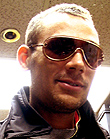|
|
This topic comprises 9 pages: 1 2 3 4 5 6 7 8 9
|
|
Author
|
Topic: Sound Sample Rates
|
F. Hudson Miller
Film Handler

Posts: 48
From: Los Angeles, CA, USA
Registered: Jun 2009
|
 posted 03-18-2013 02:41 PM
posted 03-18-2013 02:41 PM



I was reading the "worst 70mm screening" forum (now closed) and found an interesting discussion about sound sample rates in the creation of the theatrical mix. I wanted to add couple of comments to this discussion. One was the idea that after we finish the theatrical version we (I am a feature film sound designer/sound editor) go back and remix the film more carefully for BluRay . Nothing could be further from the truth. Almost all of work is done solely for the theatrical release. Being at the end of the proaction process it may be hurried, but it is never just a slap-dash holding job until we can do the home video.
I have been known to add the odd sound effect (because the VFX changed after the print master was made) or even change a music cue due to licensing issues, but this is rare and I can assure you the mix is rarely creatively altered for aftermarket release.
We often create the Near Field Mix (AKA Home Theater master) on the next day after the theatrical M&E. We have been known to raise the center dialogue channel a tad, limit the dynamic range a touch, do some bass management,or to even narrow the stereo spread a bit to conform to a narrower home screen. We may on occasion generate a 7.1 if the film has only been mastered in 5.1 (that usually just some minor re-channeling). Our single most important format is the theatrical release. That is the one the director signed off on and it is the "definitive mix." It is the reason we are making the movie.
I also want to address the questions of higher bit rates for theatrical release. While I have no scientific proof to back me up, just twenty-five years of ears, I suspect the biggest noticeable change from higher sample rates would be in the music mix. While higher resolution production and effects tracks would always be nice, I don't think there would be that much bang for the buck there. We often do new field recording at high rez sample rates, but often it is so it will give us more latitude in the digital post-production processing world.
Snark alert! No matter how loud, how clean, how detailed we make the track, we are always in competition with 400 popcorn crunchers, candy bar opened, talkers, cell phones, and sex addicts! ![[Wink]](wink.gif)
Thanks for what you guys and gals do. We work hard to provide great listening experiences to audiences, but they are only as good as the final pass through your hands. It is our job to entertain!
| IP: Logged
|
|
|
|
|
|
|
|
|
|
|
|
|
|
|
|
|
|
|
|
|
|
Scott Jentsch
Phenomenal Film Handler

Posts: 1061
From: New Berlin, WI, USA
Registered: Apr 2003
|
 posted 03-19-2013 09:00 AM
posted 03-19-2013 09:00 AM





Trying to optimize for the home theater environment is always going to be compromised, because there is no standard for home theater configurations. The variables are endless!
Many people have a 40-60" flat panel TV in their living room. Some have projectors shooting at a wall, while some have non-perf screens, while others have gone the route of an acoustically transparent perfed screen with the speakers hidden behind them. I'm actually surprised that you mentioned that last example, as I figured that would be the minority by a long shot once one got away from the houses of the rich and famous.
That's just the video environment. The sound environment is going to be different in every single situation. You're going to have the low end, with a living room equipped with a home theater in a box sub-satellite combo (most likely not calibrated), and the higher end configurations that people have put more effort into. Unfortunately, there are so many schools of thought regarding multi-channel audio, how does a sound designer make a choice of which to optimize to?
I have a 7.1 setup, with dipolar side surrounds to the side of the listening area above ear level, with two dipolar rear surrounds on the back wall. Others adhere to the more angular approach, with direct firing surrounds in the back corners (135° and 235°), with a single rear surround at 180°.
I remember reading in Widescreen Review a long time ago that DTS had the ability to embed the configuration used to do the sound mix, and a so-equipped processor could see what it was configured in the home, and the translation could be done real-time, but I don't think that has ever made it to production.
Home Theater has been hobby of mine since 1993, and when I designed my room, I tried to make the best choices I could, leaning towards a theater-style configuration rather than the "holographic" sound that people like Gary Reber advocated for home theaters.
I honestly don't know how decisions could be made to "optimize" a home theater mix with so many variables. I'd be curious to find out more, so if there are some reading materials available, or ideally, you would be willing to enlighten me with how you manage that balancing act, I would be eager to learn.
I'm not the stickler for holding to the theatrical mix like some here, but they have much more first-hand experience with the theatrical mix than I. While I am open to the idea that some optimization might be warranted, the pitfalls seem to outweigh the benefits due to the non-standard configurations. Perhaps when Atmos gets to the home, we'll have an unmodified source mix that the processor then takes and modifies with its DSP's to the owner's delight/detriment. Any chance of that?
| IP: Logged
|
|
|
|
|
|
|
|
|
|
All times are Central (GMT -6:00)
|
This topic comprises 9 pages: 1 2 3 4 5 6 7 8 9
|
Powered by Infopop Corporation
UBB.classicTM
6.3.1.2
The Film-Tech Forums are designed for various members related to the cinema industry to express their opinions, viewpoints and testimonials on various products, services and events based upon speculation, personal knowledge and factual information through use, therefore all views represented here allow no liability upon the publishers of this web site and the owners of said views assume no liability for any ill will resulting from these postings. The posts made here are for educational as well as entertainment purposes and as such anyone viewing this portion of the website must accept these views as statements of the author of that opinion
and agrees to release the authors from any and all liability.
|

 Home
Home
 Products
Products
 Store
Store
 Forum
Forum
 Warehouse
Warehouse
 Contact Us
Contact Us




 Printer-friendly view of this topic
Printer-friendly view of this topic




![[Wink]](wink.gif)











